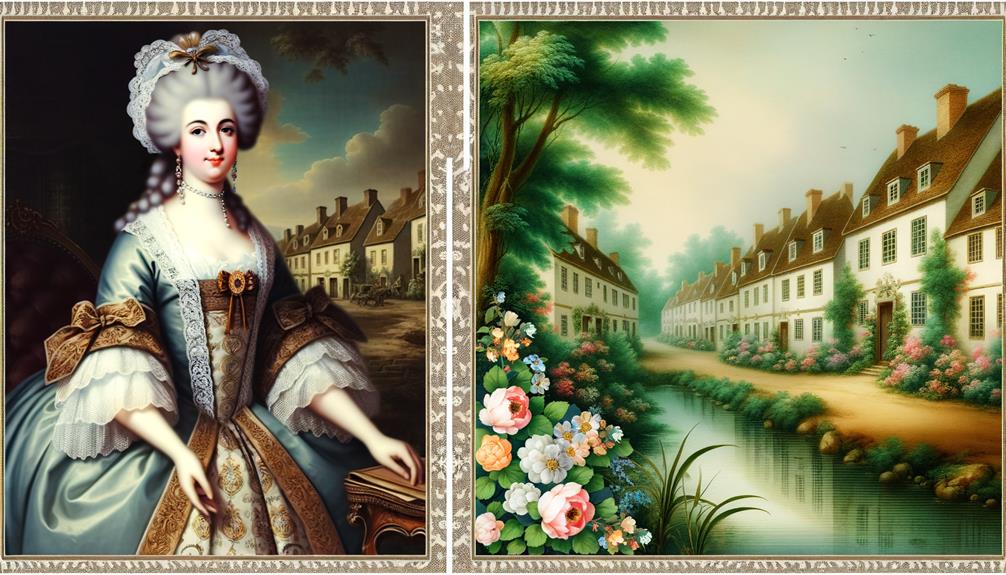Meaning of the Name Wilhelmina
The name Wilhelmina originates from the Germanic elements 'wil' meaning 'desire' and 'helm' signifying 'helmet' or 'protection', resulting in a name that conveys determined guardianship. Historically, it has been associated with nobility, resilience, and leadership, notably exemplified by Queen Wilhelmina of the Netherlands and feminist Wilhelmina Drucker.
The name's cultural impact spans across literature, aristocracy, and beyond, celebrated for its strength and dignity. Its enduring appeal lies in its blend of historical gravitas and modern charm, making it a distinctive choice with rich heritage.
For more insights into this engaging name, further exploration will reveal its full significance.

Key Takeaways
- Wilhelmina means 'determined guardian', combining Germanic elements 'wil' (will/desire) and 'helm' (helmet/protection).
- It symbolizes strength, leadership, and resilience, historically linked to noble and royal families.
- Queen Wilhelmina of the Netherlands is a notable namesake, representing fortitude during two world wars.
- The name has a rich cultural heritage, associated with dignity and steadfastness across generations.
- Modern appeal lies in its historical significance, regal connotations, and versatile nicknames like Mina, Willa, or Billie.
Etymology and Origins
The name Wilhelmina originates from the Germanic elements 'wil,' meaning 'will' or 'desire,' and 'helm,' meaning 'helmet' or 'protection.' This combination of elements conveys a sense of determined guardianship, reflecting the values and social structures of early Germanic societies.
The name is a feminine form of Wilhelm, and its usage can be traced back to medieval times when names often carried significant meanings and were chosen to impart strength and resilience. Wilhelmina emerged as a distinct name in various European cultures, particularly within noble and royal families, due to its connotations of leadership and defense.
The etymological roots of Wilhelmina offer a glimpse into the cultural importance placed on willpower and protective qualities in historical contexts.
Historical Significance
Throughout history, Wilhelmina has been borne by notable figures whose lives and legacies highlight the name's enduring association with strength and leadership. Queen Wilhelmina of the Netherlands, reigning from 1890 to 1948, is a prime example. Her tenure encompassed two world wars and the Great Depression, during which she symbolized resilience and national unity.
Additionally, Wilhelmina Drucker, a pioneering Dutch feminist, played a pivotal role in advancing women's rights in the late 19th and early 20th centuries. These historical figures exemplify the name's rich heritage and its linkage to formidable leadership and societal impact.
Their contributions underscore the name Wilhelmina as one synonymous with fortitude and transformative influence, resonating through generations.
Cultural Impact
Many cultural spheres have embraced the name Wilhelmina, imbuing it with connotations of strength and nobility.
In literature, Wilhelmina often appears as a character embodying resilience and leadership, reflecting the name's Teutonic roots meaning “will-helmet” or “protection.”
Historically, the name gained prominence in European aristocracy, particularly within the Dutch royal family, reinforcing its association with power and governance.
Moreover, Wilhelmina's usage has transcended linguistic boundaries, appearing in various forms across different cultures, each preserving its core attributes of steadfastness and dignity.
This cultural permeation has rendered Wilhelmina a name that resonates with authority and respect, cementing its place in both historical and modern contexts.
Hence, its enduring legacy continues to influence naming conventions globally.
Famous Namesakes
Reflecting its storied history and cultural importance, several notable individuals named Wilhelmina have left indelible marks across various fields. This name, rooted in Germanic tradition, has been borne by distinguished figures whose achievements span continents and centuries. From the world of fashion and modeling, to the realm of politics and activism, Wilhelminas have made their mark. The history of the name Wilhelmina is one of resilience and influence, shaping the legacies of those who have carried it. Likewise, the history of the name Tiberius holds significant weight in the realm of ancient Roman rulers, with its legacy being intricately tied to the story of the Roman Empire.
- Queen Wilhelmina of the Netherlands: Reigning from 1890 to 1948, she was a symbol of resilience, guiding her country through two World Wars.
- Wilhelmina Cooper: A pioneering fashion model and founder of Wilhelmina Models, her influence reshaped the modeling industry in the 1960s and beyond.
- Wilhelmina Drucker: A Dutch feminist and politician, she was an ardent advocate for women's rights, significantly advancing the feminist movement in the early 20th century.
These women exemplify the strength and impact that the name Wilhelmina has carried through history.
Modern-Day Appeal
In contemporary times, the name Wilhelmina continues to captivate parents and individuals alike, blending historical gravitas with a unique, timeless charm.
Derived from the Germanic elements 'wil,' meaning 'will' or 'desire,' and 'helm,' meaning 'helmet' or 'protection,' Wilhelmina offers a sense of strength and resilience. Its regal connotations, reinforced by historical figures like Queen Wilhelmina of the Netherlands, add a layer of sophistication.
Despite its vintage roots, the name has seen a resurgence due to its uncommon yet familiar sound, appealing to those seeking a distinctive yet meaningful choice. The name also holds versatile potential for modern nicknames such as Mina, Willa, or Billie, broadening its appeal across different cultural and generational contexts.
Conclusion
The name Wilhelmina, with its roots in Germanic language and its historical significance, carries a rich legacy much like an ancient tapestry woven with threads of cultural impact and notable figures.
Spanning centuries, its influence is observed through its adoption by royal families and its presence in literature and media.
Today, Wilhelmina continues to resonate, embodying a blend of tradition and modernity, appealing to those who appreciate names with profound historical depth.






